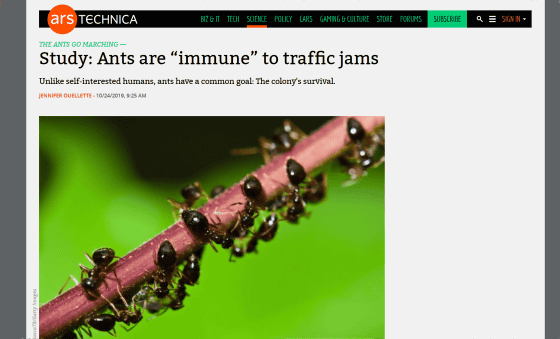Why don't ants get stuck in traffic jams?

by
Ants that form a colony with a large number of individuals form a long procession to marry the found food together to carry it to the burrow, and march regularly. Researchers are experimenting and observing the question of why ant queues do not get jammed due to traffic jams, although sometimes the density of the queues can be very high.
Experimental investigation of ant traffic under crowded conditions | eLife
https://elifesciences.org/articles/48945
Study: Ants are “immune” to traffic jams | Ars Technica
https://arstechnica.com/science/2019/10/study-ants-are-immune-to-traffic-jams/

Over the past decade, there has been a lot of research on ant collective behavior. In a 2008
In 2018, a research team from the Georgia Institute of Technology presented the results of a study on how Hiari is optimizing burrow tunneling. The fire ant tunnel is very narrow, and it seems that there are only enough widths for the two to pass each other, and as soon as each individual performs the excavation work freely, the tunnel becomes clogged.
However, when the research team observed the drilling of fire ants, it was found that the tunnel was hardly clogged or congested. When a fire ant encounters a place where another fire ant is digging, he turns back and searches for a place where the other fire ant is not digging. It was also found that 30% of the fire ants do 70% of the work, rather than all the fire ants in the whole colony digging.

by
In a new experiment conducted by Argentine ants by a research team at the University of Toulouse and the University of Arizona , colonies of various sizes and 400 to 25,600 colonies and food sources, 5 mm wide Connected with passages of various sizes of 10mm and 20mm. By changing the width of the aisle, you can limit the number of Argentine ants that can pass through at one time and control the density of the matrix.
The research team repeated 170 experiments under various conditions and recorded data such as the traffic volume of the Argentine ants, the speed of the procession, and the number of times the individual collided. In general, human pedestrians and cars start to become congested and slow down when the passage ratio exceeds 40%. However, in the case of Argentine ants, there seems to be no sign of traffic decline even if the passage ratio exceeds 80%, 'Argentina ants adjust their actions according to the situation.' The research team points out.

by
According to the paper, “As the density of the passages increased, Argentine ants evaluated the congestion locally and adapted the speed of walking so as not to interrupt the traffic flow. In addition, Argentine ants invaded crowded passages. I tried to restrain myself and never exceeded the passage capacity. ”
In the following image, the horizontal axis of the graph shows the density of the passage, the vertical axis shows the traffic volume, speed, and collision frequency from the left, the red line represents humans, and the blue line represents ants. Humans have reduced traffic when density exceeds a certain line, and moving speed continues to decrease with increasing density, while collision frequency increases with increasing density. However, in the case of ants, the traffic volume does not decrease even if the density increases, the speed decreases slowly when it exceeds a certain line, and the collision frequency does not exceed the certain line. This indicates that ants are coordinating their actions in a crowded situation and continue to maintain a smooth traffic flow.

Of course, there is no situation in the ant society that “you have to stop at a red light when there are no cars to cross,” but the researchers point out that the social structure between humans and ants is even greater. “Traffic jams are ubiquitous in the human society where people pursue their personal goals. In contrast, ants share the goal of colony survival, and ants collaborate on food. ”Is expected to optimize the behavior of recovery,” says the researcher.
The indication that 'the conflict between personal interests and collective interests causes traffic congestion in human society' has been made for a long time. A 2008 study alleges that commuting time has been increased by 30 minutes overall due to this disorder in human society.
Although there are many questions about how ants are optimizing collective interests, research on how ants adjust their behavior may reduce human social congestion. Said Ars Technica.

by Gellinger
Related Posts:







